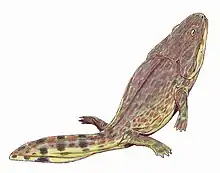Camp Springs Formation
The Camp Springs Formation is a geologic formation in the Dockum Group of Texas. It preserves fossils dating back to the Late Triassic. It has also been known as the Camp Springs Conglomerate or Camp Springs Member. The unit was originally named for an unknown locality in West Texas, and was later used in reference to sandstone and conglomerate deposits in Scurry County. It is likely equivalent to the basal beds (Tecolotito Member) of the Santa Rosa Formation, and some authors have suggested abandoning the usage of the term "Camp Springs Formation" and similar names.[1]
| Camp Springs Formation | |
|---|---|
| Stratigraphic range: Triassic | |
| Type | Formation |
| Location | |
| Region | Texas |
| Country | United States |
Paleobiota
| Extinct taxa of the Camp Springs Conglomerate | |||||
|---|---|---|---|---|---|
| Genus / Taxon | Species | Material | Notes | Images | |
| Buettnererpeton[2] | B. bakeri | A metoposaurid temnospondyl amphibian known from the Elkins Place bone bed. Previously considered a species of Metoposaurus. |  | ||
| Wannia[3] | W. scurriensis | A basal (non-mystriosuchine) phytosaur. Previously considered a species of Paleorhinus. | |||
References
- Lehman, Thomas M. (1994). "The saga of the Dockum Group and the case of the Texas/New Mexico boundary fault" (PDF). New Mexico Bureau of Mines & Mineral Resources Bulletin. 150: 37–51.
- Gee, Bryan M.; Kufner, Aaron M. (2022-10-12). "Revision of the Late Triassic metoposaurid "Metoposaurus" bakeri (Amphibia: Temnospondyli) from Texas, USA and a phylogenetic analysis of the Metoposauridae". PeerJ. 10: e14065. doi:10.7717/peerj.14065. ISSN 2167-8359.
- Stocker, M. R. (2013). "A new taxonomic arrangement for Paleorhinus scurriensis". Earth and Environmental Science Transactions of the Royal Society of Edinburgh. 103 (3–4): 251–263. doi:10.1017/S1755691013000340. S2CID 130567475.
- Various Contributors to the Paleobiology Database. "Fossilworks: Gateway to the Paleobiology Database". Retrieved 8 July 2014.
This article is issued from Wikipedia. The text is licensed under Creative Commons - Attribution - Sharealike. Additional terms may apply for the media files.